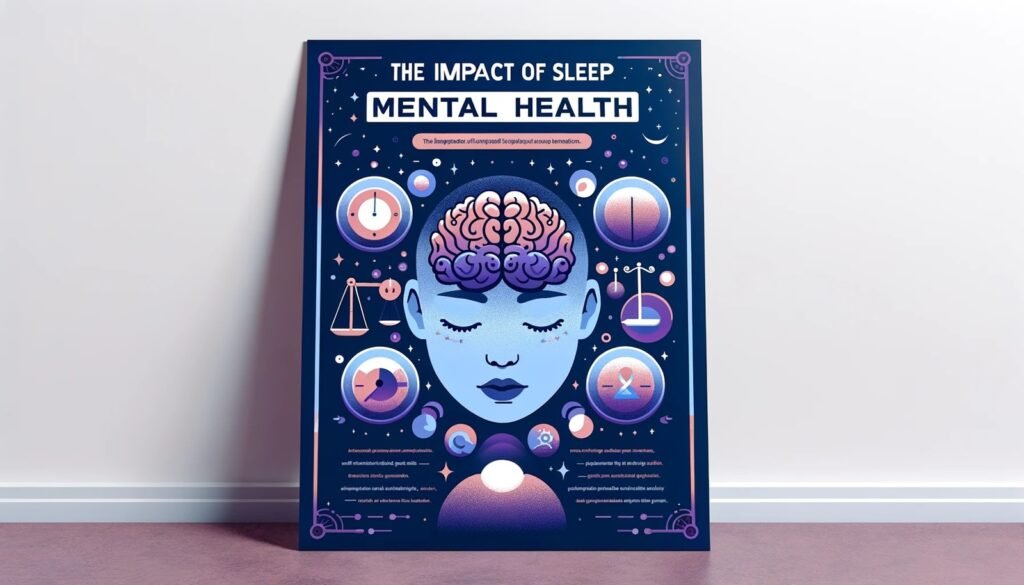
Sleep plays a crucial role in overall health, and its effects on mental health are profound and multifaceted. Understanding how sleep affects our psychological well-being can help in managing mental health more effectively. This blog explores the connection between sleep and mental health, detailing how sleep deprivation and disorders can influence mood, cognitive function, and long-term mental health.
The Importance of Sleep for Mental Well-being
Sleep is not just a period of rest but a critical function for brain health. It allows the brain to process emotional information, consolidate memories, and restore cognitive functions.
1. Emotional Regulation and Sleep
Lack of sleep can significantly impact mood and emotional reactivity. Sleep helps regulate the neurotransmitters that control mood and stress. When deprived of sleep, individuals may experience increased irritability, anxiety, and an inability to cope with stress. Moreover, sleep affects the prefrontal cortex, which manages emotional responses. Poor sleep can weaken this control, leading to more pronounced emotional reactions.
2. Sleep and Cognitive Function
Cognitive processes like thinking, learning, memory, and decision-making are all influenced by sleep. Sleep deprivation impairs attention and concentration, leading to decreased performance and productivity. During sleep, particularly in the rapid eye movement (REM) phase, the brain processes and consolidates memories. Without adequate sleep, memory consolidation is disrupted, affecting how information is stored and recalled.
3. Chronic Sleep Deprivation and Mental Health Disorders
Chronic sleep deprivation can lead to long-term mood disorders such as depression and anxiety. Studies have shown that people with insomnia are significantly more likely to develop depression. Similarly, sleep disorders like sleep apnea can exacerbate symptoms of existing mental health conditions, leading to a vicious cycle of poor sleep and poor mental health.
4. The Role of Sleep in Therapy and Recovery
Sleep is also an essential factor in the therapeutic processes for mental health recovery. Effective management of sleep conditions can enhance the outcomes of therapy for depression, anxiety, and other mental disorders. Furthermore, practices that improve sleep quality can be an integral part of treatment plans.
Strategies to Improve Sleep for Better Mental Health
- Consistent Sleep Schedule: Going to bed and waking up at the same time every day helps regulate your body’s internal clock.
- Creating a Restful Environment: Ensure your bedroom is conducive to sleep—quiet, dark, and cool.
- Limiting Screen Time: Avoid screens at least an hour before bed to decrease exposure to blue light, which can disrupt sleep patterns.
- Relaxation Techniques: Activities such as reading, meditation, or gentle yoga before bed can help ease the transition into sleep.
Conclusion
The relationship between sleep and mental health is integral and bidirectional. By prioritizing good sleep hygiene and seeking help for sleep disorders, individuals can significantly improve their mental health and quality of life.
FAQs About Sleep and Mental Health
Q: How much sleep do adults need?
A: Most adults need between 7 to 9 hours of sleep per night, but this can vary slightly from person to person.
Q: Can sleeping pills help with mental health issues?
A: While sleeping pills can help with short-term sleep issues, they are not a substitute for natural sleep and should not be relied on as a long-term solution.
Q: Are naps good for mental health?
A: Short naps (20-30 minutes) can be beneficial for brain function and mood. However, longer naps or napping late in the day can disrupt nighttime sleep.
Q: What should I do if I can’t sleep?
A: If you frequently have trouble sleeping, it may be helpful to consult a healthcare provider to determine if a sleep disorder is present.